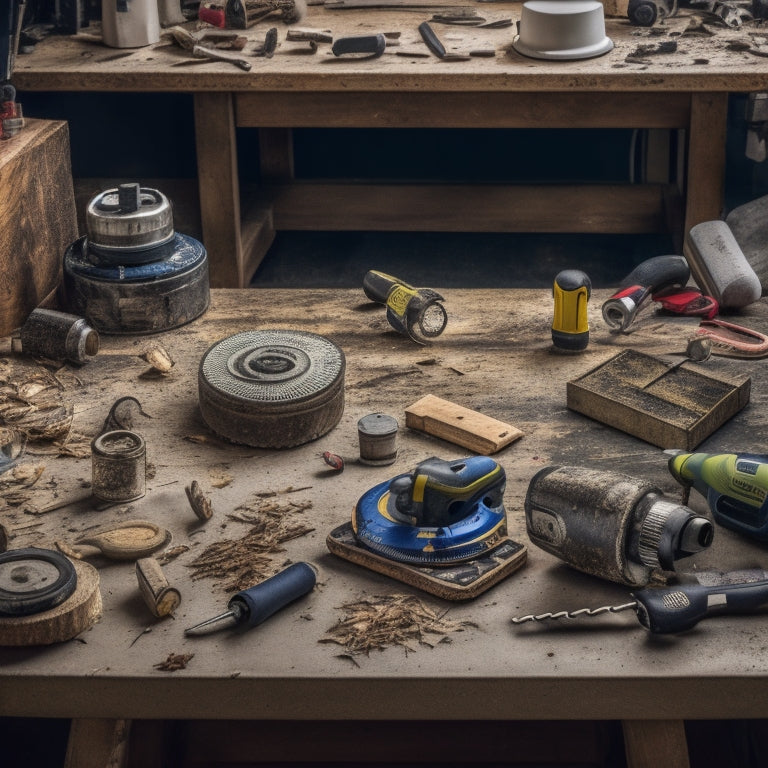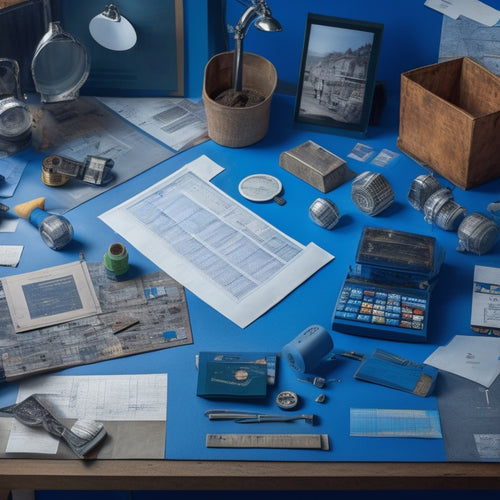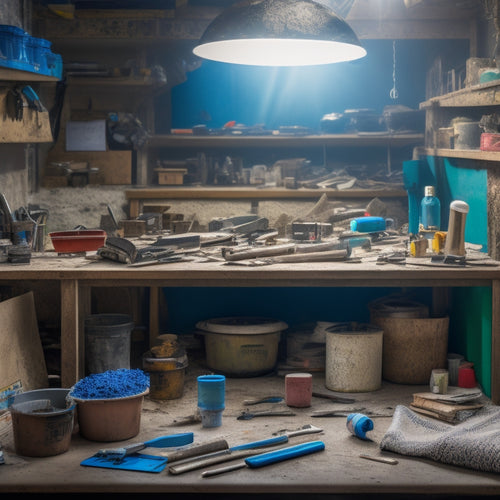
Mixing Machinery for DIY Home Renovation Success
Share
When it comes to DIY home renovation, selecting the right mixing machinery is essential for achieving professional-grade results. You'll need to take into account the type of mixer, capacity, and power source that best suits your project's needs. Planetary mixers excel at mixing heavy materials, while spiral mixers are better suited for lighter materials. Electric mixers offer energy efficiency, while gas-powered mixers provide flexibility in areas lacking electricity. To guarantee success, you'll also need to take into account essential safety features, mixer maintenance, and potential issues that may arise. As you navigate the world of mixing machinery, the key to success lies in understanding these intricacies.
Key Takeaways
• Choosing the right mixer type, such as planetary or spiral, is crucial for effective mixing of materials like concrete, mortar, paint, and adhesives.
• Mixer capacity, measured in cubic feet per batch, must be considered based on block size, volume, and density to ensure proper selection.
• Electric mixers offer energy efficiency and lower maintenance, while gas-powered mixers provide flexibility in areas without electricity, and the choice depends on project needs.
• Rental options for mixing machinery provide affordability and flexibility for short-term projects, eliminating significant upfront investment and storage concerns.
• Essential safety features, such as a sturdy base, emergency stop mechanism, and protective guard, must be considered to prevent accidents and injuries during operation.
Choosing the Right Mixer Type
When selecting a mixer for your home renovation project, you need to deliberate the specific tasks you'll be tackling and the materials you'll be working with to determine the right mixer type for the job.
Different mixer types cater to distinct mixing techniques, ensuring you achieve the desired consistency and quality. For instance, planetary mixers excel at mixing heavy, dense materials like concrete and mortar, while spiral mixers are better suited for lighter, more fluid materials like paint and adhesives.
You'll also need to take into account the capacity and power requirements of your mixer, considering the size of your batches and the frequency of use. Drum mixers, for example, are ideal for large-scale projects, whereas handheld mixers are perfect for smaller, more precise tasks.
Concrete Block Mixing Machinery Costs
When calculating the costs of concrete block mixing machinery, you'll need to evaluate the upfront expenses of purchasing a machine, including the initial investment, maintenance, and operating costs.
Alternatively, you may want to explore the rental option, which can provide a more affordable and flexible solution for your home renovation project.
Machine Purchase Considerations
Evaluating concrete block mixing machinery costs involves calculating the total expenditure, including the initial purchase price, operating expenses, and maintenance costs, to guarantee a realistic budget for your home renovation project.
As you consider purchasing a machine, you'll need to weigh budget considerations against the benefits of owning a high-quality mixer.
When making brand comparisons, research the prices of different models and their features. You may find that a more expensive machine offers advanced features, such as automated batching or higher-capacity mixing, which could be essential for your project.
On the other hand, a lower-priced option might require more manual labor or have limited capacity.
Calculate the total cost of ownership, including the initial purchase, fuel or electricity costs, and regular maintenance expenses. By doing so, you'll be able to determine which machine best fits your budget and meets your project's specific needs.
Rental Option Benefits
You may want to contemplate renting a concrete block mixing machine instead of purchasing one, especially if your home renovation project requires a high-capacity mixer for a short period. Renting can be a cost-effective solution, as it eliminates the need for a significant upfront investment. With affordable rentals, you can access high-quality machinery without breaking the bank.
Rental convenience is another significant benefit. You won't need to worry about storage or maintenance, as the rental company will handle these tasks. This frees up your time and resources, allowing you to focus on completing your project efficiently. Additionally, many rental companies offer flexible rental periods, so you can rent the machine for as long as you need it.
When renting, you'll also have access to the latest technology and machinery, which can improve the quality of your concrete blocks. Moreover, rental companies often provide operator training and support, ensuring you get the most out of your rental experience.
Essential Safety Features to Consider
Three important safety features to prioritize when selecting mixing machinery for home renovation projects are a sturdy base or stand, an emergency stop mechanism, and a protective guard or shield.
These features are vital in preventing accidents and ensuring your safety while working with heavy, rotating machinery. A sturdy base or stand will prevent the mixer from tipping over, which can cause serious injury or damage. An emergency stop mechanism allows you to quickly shut off the machine in case of an emergency, giving you control over the situation.
You should also consider investing in personal safety gear, such as gloves, safety glasses, and a dust mask, to protect yourself from flying debris and hazardous materials.
It's important to develop emergency procedures, such as knowing the location of the emergency stop and having a first-aid kit nearby, in case of an accident.
Mixer Capacity for Block Sizes
When selecting a mixer for your home renovation project, you'll need to determine the ideal mixer capacity based on the block sizes you're working with.
To do this, you'll need to calculate the volume of each block and then match it to a mixer with a suitable capacity rating.
Block Size Calculations
A mixer's capacity is typically determined by the size of the blocks it can handle, with smaller mixers suitable for producing blocks up to 10 inches in length, while larger machines can accommodate blocks up to 20 inches or more.
When calculating block size, you'll need to take into account the block volume, which is the total volume of the concrete required to fill the block mold. To determine this, you'll need to know the dimensions of the block and the mix ratios you're using. For example, if you're using a 1:2:3 mix ratio (cement:sand:aggregate), you'll need to calculate the total volume of each component required to fill the mold.
To calculate block volume, multiply the length, width, and height of the block. For a 10-inch block, this would be 10 inches x 10 inches x 5 inches = 500 cubic inches.
You'll then need to convert this volume to a weight, taking into account the density of the concrete. This will give you the total weight of the block, which will help you determine the mixer capacity required.
Mixer Capacity Ratings
You'll need to verify your mixer can handle the calculated block volume by checking its capacity rating, which is typically measured in cubic feet per batch or batch cycle time. This rating guarantees you don't overload the mixer, compromising its performance and longevity.
To determine the ideal mixer capacity, consider the block size calculations from earlier. Compare the calculated volume to the mixer's capacity rating to confirm a match.
Mixer efficiency ratings also play an important role in determining the ideal mixer capacity. A higher efficiency rating indicates the mixer can handle more material per batch, while a lower rating may require smaller batches.
Effective mixing techniques, such as gradually adding materials and maintaining a consistent mixing speed, can further enhance the mixer's capacity.
Electric Vs Gas-Powered Mixers
Your mixing machinery selection hinges on whether to opt for electric or gas-powered mixers, each with its unique advantages and limitations that can considerably impact your home renovation project's efficiency and cost.
When it comes to mixer performance comparison, you'll want to evaluate the power output, speed, and torque of each type.
Here are some key differences to evaluate:
-
Electric mixers are generally more energy-efficient, with higher power factors and lower energy losses, making them a more cost-effective option in the long run.
-
Gas-powered mixers, on the other hand, offer more power and flexibility, especially in areas where electricity is limited or unavailable.
-
Regarding maintenance, electric mixers are relatively low-maintenance, with fewer moving parts and no oil changes required, whereas gas-powered mixers require regular tune-ups and oil changes.
When conducting an energy efficiency analysis, you'll want to evaluate your specific project needs and the resources available to you.
Portable Mixer Benefits for DIY
By choosing a portable mixer, you can eliminate the constraints of power source availability, allowing you to work efficiently in various locations throughout your DIY home renovation project. This flexibility is especially valuable when working on multi-room or outdoor projects, where access to power outlets may be limited.
Portable mixers also reduce the risk of tripping hazards and cord damage, creating a safer work environment.
When selecting a portable mixer, consider the weight, size, and battery life to guarantee it meets your project's demands. Look for models with adjustable speed controls, allowing you to tailor the mixing action to your specific material needs. Additionally, some portable mixers come with multiple mixing paddles, further increasing their versatility.
In DIY projects, portable mixers are ideal for tasks such as mixing small batches of concrete, mortar, or drywall compound. They're also suitable for mixing adhesives, epoxies, and other materials that require precise control.
Mixer Maintenance and Upkeep
To guarantee ideal performance and extend the lifespan of your mixer, regular cleaning and inspection are essential, as residual material buildup and worn-out components can greatly impact mixing efficiency and accuracy.
You should establish a routine for mixer cleaning, paying attention to areas that come into contact with materials, such as the drum, paddles, and discharge gates. Remove any dried-on material and wash with a mild detergent.
Additionally, you'll want to:
-
Inspect the mixer's gears and bearings for signs of wear, and apply lubrication techniques as needed to prevent overheating and premature wear.
-
Check the mixer's electrical components, such as the motor and switches, for signs of wear or damage, and replace them as needed.
-
Verify that all bolts and screws are securely tightened to prevent vibration and noise during operation.
Common Mixing Machinery Issues
During operation, mixers can develop issues that hinder their performance, and recognizing these problems early on is essential to maintaining efficiency and preventing costly repairs.
As you work with your mixer, you may encounter common mixer malfunctions, such as uneven mixing, excessive vibration, or overheating. To troubleshoot these issues, start by checking the mixer's power supply, verifying it's receiving the correct voltage and amperage.
Next, inspect the mixer's blades and paddles for wear and tear, replacing them if necessary. Additionally, confirm the mixer is properly balanced and level, as unevenness can cause vibration and affect mixing performance.
You should also regularly check the mixer's belts and gears for signs of wear, adjusting or replacing them as needed. By following these mixer troubleshooting tips, you'll be able to identify and address common mixer malfunctions, keeping your mixer running smoothly and efficiently throughout your DIY home renovation projects.
Block Mixing Machinery Accessories
You'll need a range of block mixing machinery accessories to optimize your mixer's performance and guarantee successful DIY home renovation projects.
These accessories are designed to enhance the functionality of your mixer, ensuring you achieve the desired consistency and quality of your mixes. To get the most out of your mixer, consider investing in the following block accessories:
-
Paddle and drum liners: These accessories help prevent material buildup and simplify the cleaning process, saving you time and effort.
-
Mixing paddles with different blade configurations: These allow you to adapt to various mixing techniques and materials, ensuring you can tackle a wide range of projects.
-
Drum extensions and dividers: These accessories enable you to increase the capacity of your mixer and separate different materials, making it easier to work on complex projects.
Frequently Asked Questions
Can I Use My Mixer for Other Materials Like Mortar or Plaster?
Can you use your mixer for other materials like mortar or plaster?
You'll need to take into account mixer versatility and material compatibility first.
Check your mixer's specifications for recommended materials and capacities.
If it's designed for heavy-duty mixing, you might be able to use it for mortar or plaster.
However, using the wrong material can damage your mixer or compromise the mix quality.
Always consult the manufacturer's guidelines to guarantee safe and effective mixing.
Do I Need Special Training to Operate Mixing Machinery?
As you venture into uncharted territory, you'll want to guarantee you're well-versed in operating mixing machinery.
Don't assume you can wing it - you must familiarize yourself with safety precautions and operational guidelines to avoid costly mistakes.
Take the time to thoroughly read the manual, understand the machinery's capabilities, and practice under controlled conditions.
Can I Rent Mixing Machinery for a One-Time Project?
You're considering renting mixing machinery for a one-time project, and that's a smart move.
Evaluating rental options is essential to guarantee you get the right equipment for your project duration. Assess the scope of your project and estimate the time needed to complete it.
Then, research rental companies that offer flexible rental periods, from daily to weekly or monthly rates. This will help you choose the best option for your project's specific needs.
Are There Any Environmental Concerns With Mixing Machinery?
Are you prepared to sacrifice the serenity of your surroundings for the sake of your project?
When operating mixing machinery, you're not only dealing with the obvious noise pollution, but also the environmental impact of your choices.
You'll want to reflect on sustainability practices, such as choosing energy-efficient machines and responsible waste disposal.
Can I Customize My Mixer With Additional Features or Attachments?
You can optimize your mixer by adding specific attachments and custom features tailored to your needs.
Look for mixers with modular designs, allowing you to swap out or add components as required.
Consider attachments like paddle extensions, drum liners, or high-torque motors to enhance performance.
Additionally, explore custom features like variable speed control, precision timers, or digital displays to refine your mixing process.
Conclusion
As you rev up your DIY home renovation, remember that the right mixing machinery is the rhythm that keeps your project in harmony.
With the perfect blend of power, precision, and safety, you'll be laying blocks like a pro.
Don't let mixing machinery mishaps throw you off beat - stay tuned to maintenance, upkeep, and accessorizing.
Now, get mixing and watch your renovation vision come to life, one perfectly poured block at a time!
Related Posts
-

Why Do Cinder Block Wall Renovations Cost So Much
You're likely surprised by the high cost estimate for your cinder block wall renovation project, but it's driven by s...
-

5 Best Home Renovation Project Timeline Checklists
You're looking for a clear understanding of the timeline for your home renovation project. A good place to start is w...
-

Get Discounted Plastering Tool Sets for DIY Renovations
You can find discounted plastering tool sets online, at local hardware stores, and thrift stores, offering a range of...


